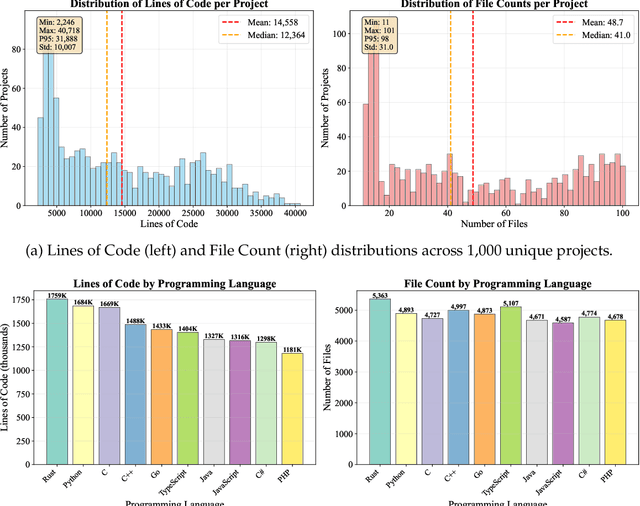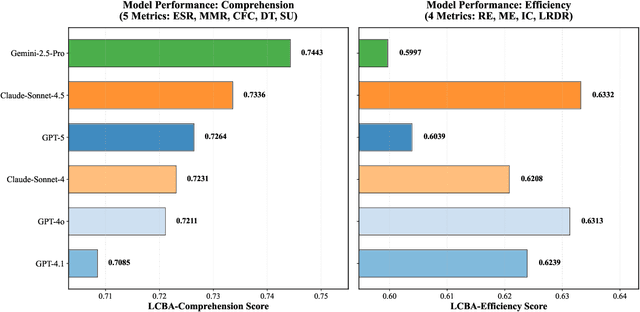Ming Zhu
LoCoBench-Agent: An Interactive Benchmark for LLM Agents in Long-Context Software Engineering
Nov 17, 2025



Abstract:As large language models (LLMs) evolve into sophisticated autonomous agents capable of complex software development tasks, evaluating their real-world capabilities becomes critical. While existing benchmarks like LoCoBench~\cite{qiu2025locobench} assess long-context code understanding, they focus on single-turn evaluation and cannot capture the multi-turn interactive nature, tool usage patterns, and adaptive reasoning required by real-world coding agents. We introduce \textbf{LoCoBench-Agent}, a comprehensive evaluation framework specifically designed to assess LLM agents in realistic, long-context software engineering workflows. Our framework extends LoCoBench's 8,000 scenarios into interactive agent environments, enabling systematic evaluation of multi-turn conversations, tool usage efficiency, error recovery, and architectural consistency across extended development sessions. We also introduce an evaluation methodology with 9 metrics across comprehension and efficiency dimensions. Our framework provides agents with 8 specialized tools (file operations, search, code analysis) and evaluates them across context lengths ranging from 10K to 1M tokens, enabling precise assessment of long-context performance. Through systematic evaluation of state-of-the-art models, we reveal several key findings: (1) agents exhibit remarkable long-context robustness; (2) comprehension-efficiency trade-off exists with negative correlation, where thorough exploration increases comprehension but reduces efficiency; and (3) conversation efficiency varies dramatically across models, with strategic tool usage patterns differentiating high-performing agents. As the first long-context LLM agent benchmark for software engineering, LoCoBench-Agent establishes a rigorous foundation for measuring agent capabilities, identifying performance gaps, and advancing autonomous software development at scale.
GeoGNN: Quantifying and Mitigating Semantic Drift in Text-Attributed Graphs
Nov 12, 2025Abstract:Graph neural networks (GNNs) on text--attributed graphs (TAGs) typically encode node texts using pretrained language models (PLMs) and propagate these embeddings through linear neighborhood aggregation. However, the representation spaces of modern PLMs are highly non--linear and geometrically structured, where textual embeddings reside on curved semantic manifolds rather than flat Euclidean spaces. Linear aggregation on such manifolds inevitably distorts geometry and causes semantic drift--a phenomenon where aggregated representations deviate from the intrinsic manifold, losing semantic fidelity and expressive power. To quantitatively investigate this problem, this work introduces a local PCA--based metric that measures the degree of semantic drift and provides the first quantitative framework to analyze how different aggregation mechanisms affect manifold structure. Building upon these insights, we propose Geodesic Aggregation, a manifold--aware mechanism that aggregates neighbor information along geodesics via log--exp mappings on the unit sphere, ensuring that representations remain faithful to the semantic manifold during message passing. We further develop GeoGNN, a practical instantiation that integrates spherical attention with manifold interpolation. Extensive experiments across four benchmark datasets and multiple text encoders show that GeoGNN substantially mitigates semantic drift and consistently outperforms strong baselines, establishing the importance of manifold--aware aggregation in text--attributed graph learning.
LoCoBench: A Benchmark for Long-Context Large Language Models in Complex Software Engineering
Sep 11, 2025



Abstract:The emergence of long-context language models with context windows extending to millions of tokens has created new opportunities for sophisticated code understanding and software development evaluation. We propose LoCoBench, a comprehensive benchmark specifically designed to evaluate long-context LLMs in realistic, complex software development scenarios. Unlike existing code evaluation benchmarks that focus on single-function completion or short-context tasks, LoCoBench addresses the critical evaluation gap for long-context capabilities that require understanding entire codebases, reasoning across multiple files, and maintaining architectural consistency across large-scale software systems. Our benchmark provides 8,000 evaluation scenarios systematically generated across 10 programming languages, with context lengths spanning 10K to 1M tokens, a 100x variation that enables precise assessment of long-context performance degradation in realistic software development settings. LoCoBench introduces 8 task categories that capture essential long-context capabilities: architectural understanding, cross-file refactoring, multi-session development, bug investigation, feature implementation, code comprehension, integration testing, and security analysis. Through a 5-phase pipeline, we create diverse, high-quality scenarios that challenge LLMs to reason about complex codebases at unprecedented scale. We introduce a comprehensive evaluation framework with 17 metrics across 4 dimensions, including 8 new evaluation metrics, combined in a LoCoBench Score (LCBS). Our evaluation of state-of-the-art long-context models reveals substantial performance gaps, demonstrating that long-context understanding in complex software development represents a significant unsolved challenge that demands more attention. LoCoBench is released at: https://github.com/SalesforceAIResearch/LoCoBench.
GhostShell: Streaming LLM Function Calls for Concurrent Embodied Programming
Aug 07, 2025



Abstract:We present GhostShell, a novel approach that leverages Large Language Models (LLMs) to enable streaming and concurrent behavioral programming for embodied systems. In contrast to conventional methods that rely on pre-scheduled action sequences or behavior trees, GhostShell drives embodied systems to act on-the-fly by issuing function calls incrementally as tokens are streamed from the LLM. GhostShell features a streaming XML function token parser, a dynamic function interface mapper, and a multi-channel scheduler that orchestrates intra-channel synchronous and inter-channel asynchronous function calls, thereby coordinating serial-parallel embodied actions across multiple robotic components as directed by the LLM. We evaluate GhostShell on our robot prototype COCO through comprehensive grounded experiments across 34 real-world interaction tasks and multiple LLMs. The results demonstrate that our approach achieves state-of-the-art Behavioral Correctness Metric of 0.85 with Claude-4 Sonnet and up to 66X faster response times compared to LLM native function calling APIs. GhostShell also proves effective in long-horizon multimodal tasks, demonstrating strong robustness and generalization.
APIGen-MT: Agentic Pipeline for Multi-Turn Data Generation via Simulated Agent-Human Interplay
Apr 08, 2025Abstract:Training effective AI agents for multi-turn interactions requires high-quality data that captures realistic human-agent dynamics, yet such data is scarce and expensive to collect manually. We introduce APIGen-MT, a two-phase framework that generates verifiable and diverse multi-turn agent data. In the first phase, our agentic pipeline produces detailed task blueprints with ground-truth actions, leveraging a committee of LLM reviewers and iterative feedback loops. These blueprints are then transformed into complete interaction trajectories through simulated human-agent interplay. We train a family of models -- the xLAM-2-fc-r series with sizes ranging from 1B to 70B parameters. Our models outperform frontier models such as GPT-4o and Claude 3.5 on $\tau$-bench and BFCL benchmarks, with the smaller models surpassing their larger counterparts, particularly in multi-turn settings, while maintaining superior consistency across multiple trials. Comprehensive experiments demonstrate that our verified blueprint-to-details approach yields high-quality training data, enabling the development of more reliable, efficient, and capable agents. We open-source both the synthetic data collected and the trained xLAM-2-fc-r models to advance research in AI agents. Models are available on HuggingFace at https://huggingface.co/collections/Salesforce/xlam-2-67ef5be12949d8dcdae354c4 and project website is https://apigen-mt.github.io
DoCIA: An Online Document-Level Context Incorporation Agent for Speech Translation
Apr 07, 2025Abstract:Document-level context is crucial for handling discourse challenges in text-to-text document-level machine translation (MT). Despite the increased discourse challenges introduced by noise from automatic speech recognition (ASR), the integration of document-level context in speech translation (ST) remains insufficiently explored. In this paper, we develop DoCIA, an online framework that enhances ST performance by incorporating document-level context. DoCIA decomposes the ST pipeline into four stages. Document-level context is integrated into the ASR refinement, MT, and MT refinement stages through auxiliary LLM (large language model)-based modules. Furthermore, DoCIA leverages document-level information in a multi-level manner while minimizing computational overhead. Additionally, a simple yet effective determination mechanism is introduced to prevent hallucinations from excessive refinement, ensuring the reliability of the final results. Experimental results show that DoCIA significantly outperforms traditional ST baselines in both sentence and discourse metrics across four LLMs, demonstrating its effectiveness in improving ST performance.
ActionStudio: A Lightweight Framework for Data and Training of Large Action Models
Mar 31, 2025Abstract:Action models are essential for enabling autonomous agents to perform complex tasks. However, training large action models remains challenging due to the diversity of agent environments and the complexity of agentic data. Despite growing interest, existing infrastructure provides limited support for scalable, agent-specific fine-tuning. We present ActionStudio, a lightweight and extensible data and training framework designed for large action models. ActionStudio unifies heterogeneous agent trajectories through a standardized format, supports diverse training paradigms including LoRA, full fine-tuning, and distributed setups, and integrates robust preprocessing and verification tools. We validate its effectiveness across both public and realistic industry benchmarks, demonstrating strong performance and practical scalability. We open-sourced code and data at https://github.com/SalesforceAIResearch/xLAM to facilitate research in the community.
PersonaBench: Evaluating AI Models on Understanding Personal Information through Accessing (Synthetic) Private User Data
Feb 28, 2025Abstract:Personalization is critical in AI assistants, particularly in the context of private AI models that work with individual users. A key scenario in this domain involves enabling AI models to access and interpret a user's private data (e.g., conversation history, user-AI interactions, app usage) to understand personal details such as biographical information, preferences, and social connections. However, due to the sensitive nature of such data, there are no publicly available datasets that allow us to assess an AI model's ability to understand users through direct access to personal information. To address this gap, we introduce a synthetic data generation pipeline that creates diverse, realistic user profiles and private documents simulating human activities. Leveraging this synthetic data, we present PersonaBench, a benchmark designed to evaluate AI models' performance in understanding personal information derived from simulated private user data. We evaluate Retrieval-Augmented Generation (RAG) pipelines using questions directly related to a user's personal information, supported by the relevant private documents provided to the models. Our results reveal that current retrieval-augmented AI models struggle to answer private questions by extracting personal information from user documents, highlighting the need for improved methodologies to enhance personalization capabilities in AI.
SpecTool: A Benchmark for Characterizing Errors in Tool-Use LLMs
Nov 20, 2024



Abstract:Evaluating the output of Large Language Models (LLMs) is one of the most critical aspects of building a performant compound AI system. Since the output from LLMs propagate to downstream steps, identifying LLM errors is crucial to system performance. A common task for LLMs in AI systems is tool use. While there are several benchmark environments for evaluating LLMs on this task, they typically only give a success rate without any explanation of the failure cases. To solve this problem, we introduce SpecTool, a new benchmark to identify error patterns in LLM output on tool-use tasks. Our benchmark data set comprises of queries from diverse environments that can be used to test for the presence of seven newly characterized error patterns. Using SPECTOOL , we show that even the most prominent LLMs exhibit these error patterns in their outputs. Researchers can use the analysis and insights from SPECTOOL to guide their error mitigation strategies.
PRACT: Optimizing Principled Reasoning and Acting of LLM Agent
Oct 24, 2024



Abstract:We introduce the Principled Reasoning and Acting (PRAct) framework, a novel method for learning and enforcing action principles from trajectory data. Central to our approach is the use of text gradients from a reflection and optimization engine to derive these action principles. To adapt action principles to specific task requirements, we propose a new optimization framework, Reflective Principle Optimization (RPO). After execution, RPO employs a reflector to critique current action principles and an optimizer to update them accordingly. We develop the RPO framework under two scenarios: Reward-RPO, which uses environmental rewards for reflection, and Self-RPO, which conducts self-reflection without external rewards. Additionally, two RPO methods, RPO-Traj and RPO-Batch, is introduced to adapt to different settings. Experimental results across four environments demonstrate that the PRAct agent, leveraging the RPO framework, effectively learns and applies action principles to enhance performance.
 Add to Chrome
Add to Chrome Add to Firefox
Add to Firefox Add to Edge
Add to Edge